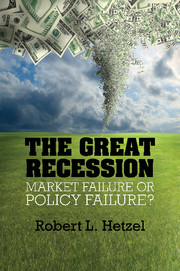Crossref Citations
This Book has been
cited by the following publications. This list is generated based on data provided by Crossref.
Sumner, Scott
2012.
The Case for Nominal GDP Targeting.
SSRN Electronic Journal ,
2013.
Democracy and its Elected Enemies.
p.
45.
Salter, Alexander William
2013.
A Theory of the Dynamics of Entangled Political Economy with Application to the Federal Reserve.
SSRN Electronic Journal,
Salter, Alexander William
2013.
Robust Political Economy and the Lender of Last Resort.
SSRN Electronic Journal,
Salter, Alexander William
2013.
Is There a Self-Enforcing Monetary Constitution?.
SSRN Electronic Journal,
Tavlas, G. S.
2014.
In Old Chicago: Simons, Friedman and the Development of Monetary-Policy Rules.
SSRN Electronic Journal,
Tavlas, George
2014.
In Old Chicago: Simons, Friedman and the Development of Monetary-Policy Rules.
SSRN Electronic Journal ,
Romer, Christina D.
2014.
It Takes a Regime Shift: Recent Developments in Japanese Monetary Policy through the Lens of the Great Depression.
NBER Macroeconomics Annual,
Vol. 28,
Issue. ,
p.
383.
Salter, Alexander William
2014.
Is there a self-enforcing monetary constitution?.
Constitutional Political Economy,
Vol. 25,
Issue. 3,
p.
280.
Kang, Dae Woong
Ligthart, Nick
and
Mody, Ashoka
2015.
The European Central Bank: Building a Shelter in a Storm.
SSRN Electronic Journal,
Salter, Alexander William
and
Tarko, Vlad
2015.
Polycentric Banking and Macroeconomic Stability.
SSRN Electronic Journal,
Kang, Dae Woong
Ligthart, Nick
and
Mody, Ashoka
2015.
The European Central Bank: Building a Shelter in a Storm.
SSRN Electronic Journal,
Belongia, Michael T.
and
Ireland, Peter N.
2015.
A “WORKING” SOLUTION TO THE QUESTION OF NOMINAL GDP TARGETING.
Macroeconomic Dynamics,
Vol. 19,
Issue. 3,
p.
508.
TAVLAS, GEORGE S.
2015.
In Old Chicago: Simons, Friedman, and the Development of Monetary‐Policy Rules.
Journal of Money, Credit and Banking,
Vol. 47,
Issue. 1,
p.
99.
Aysa-Lastra, María
and
Cachón, Lorenzo
2015.
Immigrant Vulnerability and Resilience.
Vol. 11,
Issue. ,
p.
1.
Salter, Alexander
2015.
Marcus Nunes and Benjamin Cole: Market monetarism: Roadmap to economic prosperity.
The Review of Austrian Economics,
Vol. 28,
Issue. 1,
p.
107.
Scheall, Scott
2015.
Slaves of the defunct: the epistemic intractability of the Hayek–Keynes debate.
Journal of Economic Methodology,
Vol. 22,
Issue. 2,
p.
215.
HOGAN, THOMAS L.
LE, LINH
and
SALTER, ALEXANDER WILLIAM
2015.
Ben Bernanke and Bagehot's Rules.
Journal of Money, Credit and Banking,
Vol. 47,
Issue. 2-3,
p.
333.
Salter, Alexander William
2016.
Robust Political Economy and the Lender of Last Resort.
Journal of Financial Services Research,
Vol. 50,
Issue. 1,
p.
1.
Paniagua, Pablo
2016.
The robust political economy of central banking and free banking.
The Review of Austrian Economics,
Vol. 29,
Issue. 1,
p.
15.



